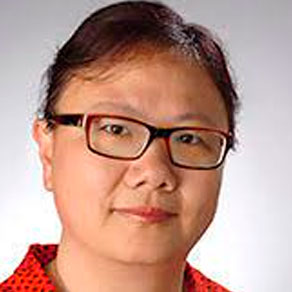
Guo-Wei Wei
[introductory/advanced] Discovering the Mechanisms of SARS-CoV-2 Evolution and Transmission [virtual]
Summary
Discovering the mechanisms of SARS-CoV-2 evolution and transmission is one of the greatest challenges of our time. By integrating artificial intelligence (AI), viral genomes isolated from patients, tens of thousands of mutational data, biophysics, bioinformatics, and algebraic topology, the SARS-CoV-2 evolution was revealed to be governed by infectivity-based natural selection in early 2020 (J. of Mole. Biol. 2020, 432, 5212-5226). Two key mutation sites, L452 and N501 on the viral spike protein receptor-binding domain (RBD), were predicted in summer 2020, long before they occur in prevailing variants Alpha, Beta, Gamma, Delta, Kappa, Theta, Lambda, Mu, and Omicron. Our recent studies identified a new mechanism of natural selection: antibody resistance (J. Phys. Chem. Lett. 2021, 12, 49, 11850–11857). AI-based forecasting of Omicron’s infectivity, vaccine breakthrough, and antibody resistance was later nearly perfectly confirmed by experiments (J. Chem. Inf. Model. 2022, 62, 2, 412–422). The replacement of dominant BA.1 by BA.2 in later March was foretold in early February (J. Phys. Chem. Lett. 2022, 13, 17, 3840–3849). On May 1, 2022, we projected Omicron BA.4 and BA.5 to become the new dominating COVID-19 variants (arXiv:2205.00532). This prediction became reality in late June. Our models accurately forecast mutational impacts on the efficacy of monoclonal antibodies (mAbs).
Syllabus
Part 1: Introduction: SARS-CoV-2 and COVID-19.
Part 2: Methods: Genotyping, biophysics, deep learning, and mathematics.
Part 3: Results: SARS-CoV-2 variant modelling and prediction.
References
https://users.math.msu.edu/users/weig/paper/p246.pdf
https://users.math.msu.edu/users/weig/paper/p272.pdf
https://users.math.msu.edu/users/weig/paper/p279.pdf
https://users.math.msu.edu/users/weig/paper/p285.pdf
https://users.math.msu.edu/users/weig/paper/p289.pdf
Pre-requisites
Basic machine learning, basic SARS-CoV-2 or COVID-19, and basic mathematics.
Short bio
Guowei Wei earned his Ph. D. degree from the University of British Columbia in 1996. He was awarded a postdoctoral fellowship from the NSERC of Canada to pursue his postdoctoral work at the University of Houston. In 1998, he joined the faculty of the National University of Singapore and was promoted to Associate Professor in 2001. In 2002, he relocated to Michigan State University, where he is an MSU Foundation Professor of Mathematics, Electrical and Computer Engineering, and Biochemistry and Molecular Biology. His current research interests include mathematical biosciences, deep learning, drug discovery, and computational geometry, topology, and graphs. Dr. Wei has served extensively in a wide variety of national and international panels, committees, and journal editorships. His work was reported in numerous news and media articles.






















